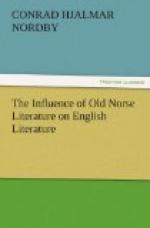In the three volumes of The Earthly Paradise, published by William Morris in 1868-1870, there are three poems which hail from Old Norse originals. They are “The Land East of the Sun and West of the Moon,” and “The Lovers of Gudrun,” in Vol. II, and “The Fostering of Aslaug,” in Vol. III. Of these “The Lovers of Gudrun” forms a class by itself; it is a poem to be reckoned with when the dozen greatest poems of the century are listed. The late Laureate may have equalled it in the best of the Idylls of the King, but he never excelled it. Let us look at it in detail.
First, be it said that “The Lovers of Gudrun” overtops all the other poems in The Earthly Paradise. It would be possible to prove that Morris was at his best when he worked with Old Norse material, but that task shall not detain us now. It is enough to note that the “Prologue” to The Earthly Paradise, called “The Wanderers,” makes the leader of these wanderers, who turn story-tellers when they reach the city by “the borders of the Grecian sea,” a Norseman. Born in Byzantium of a Greek mother, he claimed Norway as his home, and on his father’s death returned to his kin. His speech to the Elder of the City reveals a touching loyalty to his father’s home and traditions:
But when I reached one dying
autumn-tide
My uncle’s dwelling
near the forest-side,
And saw the land so scanty
and so bare,
And all the hard things men
contend with there,
A little and unworthy land
it seemed,
And yet the more of Asagard
I dreamed,
And worthier seemed the ancient
faith of praise.
Here is the man, William Morris, in perfect miniature. Modern life and training had given him a speech and aspect quite suave and cultured, but the blood that flowed in his veins was red, and the tincture of iron was in it. In religion, in art, in poetry, in economics, he loved the past better than the present, though he was never unconscious of “our glorious gains.” In all departments of thought the scanty, the bare, the hard, the unworthy, drew first his attention and then his love and enthusiastic praise. And so perhaps it is explained that of all the poems in The Earthly Paradise, the one indited first in the scarred and dreadful land where neither wheat nor wine is at home, shall be the finest in this latter-day retelling.
The first seventy years of the thirteenth century were the blossoming time of the historic saga in Iceland, and those writings that record the doings of the families of the land form, with the old songs and the best of the kingly sagas, the flower of Northern literature. These family records never extend over more than one generation, and sometimes they deal with but a few years. They are half-way between romance and history, with the balance oftenest in favor of truth. In this group are found Egils Saga, known at second hand to Warton, the Eyrbyggja Saga, translated by Walter Scott, and the Laxdaela Saga. It is the Laxdaela Saga that gives the story told by Morris in “The Lovers of Gudrun.” Among sagas it is famous for its fine portrayal of character.




